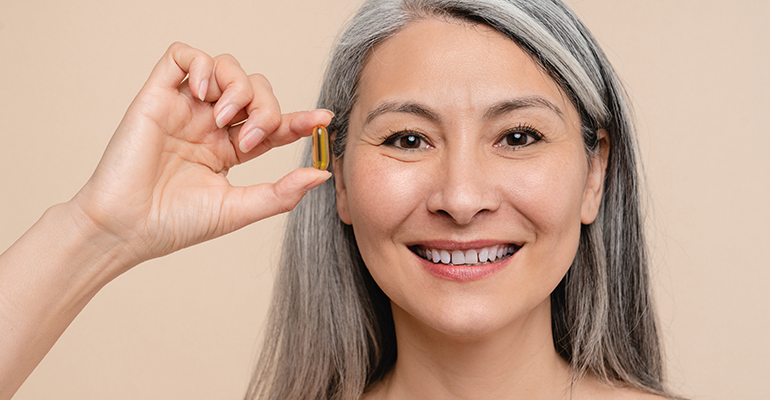News
Wile Women embraces perimenopause ecosystem with support and education
6 Oct 2023
Wile Women, a US-based direct-to-consumer supplement brand, offers “naturopathic” products designed to address women’s mental health and aims to break the stigma surrounding perimenopause.
The realities of perimenopause can hit hard for some women as lack of education and resources may contribute to an uneasy transition.

As Corey Scholibo, co-founder, president and COO at Wile Women explained, the “appalling gaslighting” and lack of information inspired the brand to address this untapped market. Its range is made up of supplements, tinctures, and functional drinks.
Scholibo said: “When we launched this brand, we couldn't believe how many women we surveyed were thanking us for even asking these questions, and then sending the survey on to ten of their friends.
“We wanted to build a naturopathic line that could support women in this phase of life, with the cleanest, most effective herbs, that had been proven to work in naturopathy in some cases for hundreds of years,” he added.
“When we did our research, we realised that nine out of 10 women are looking not for hormone replacement therapy but [over the counter] OTC solutions. We wanted to bring that system to shelves where women could have easy access to solutions.”
Retail partners and investors on board with Wile Women’s philosophy
Scholibo said that the company was “choosy” when it came to retail partners and investors.
“We partner with story-rich retailers like Whole Foods and Spouts, places where there is staff to help her navigate her choices.
“We launched at Whole Foods on end cap [a display for a product placed at the end of a supermarket aisle] … for the first time talking about perimenopause to their customers. They have even rethought their strategy around the set with us in mind.
“Sprouts similarly leaned very heavily into this and then allowed us to activate the store managers, point of purchase. They are taking a meaningful position on this customer; if the retailer or the investor isn't taking a point of view on her and her journey, it is probably not the right fit.”
Energy, vitality, and stability
Alongside co-founders Gwen Floyd, Julie Kucinski, and actress Judy Greer, Wile Women’s ethos extends beyond its range of supplements, tinctures, and functional drinks.
 © AdobeStock/GoodIdeas
© AdobeStock/GoodIdeas
The brand has created educational resources that help dispel the myths around perimenopause, placing an emphasis on the mental toll it may place on a woman.
“Most women say that they want to ‘feel like themselves again’,” said Scholibo. “This is important because they are concerned about their looks too, but they don't want to be younger or go backwards.
“They want to feel like their adult self with the energy, vitality, and stability they felt before.”
Scholibo added that while women may find their increased feelings of anger "negative," Wile has a product to address it.
“We also talk openly about anger, worry, stress eating, and the other real things that are coming up in her life and reframe it a bit.”
Natural, hormone-regulating botanical extracts
Wile Women’s product range taps into current lifestyle trends that appeal to women 40+, who are time poor but look to natural, authentic ingredients to address their health concerns.
This includes formulations containing hormone-regulating botanical extracts such as ashwagandha, kudzu root, fennel seed, and chaste tree fruit.
Other products on offer include formulations for stress and mood that contain corydalis root, lemon balm leaf and black cohosh root and rhizome.
 © AdobeStock/InsideCreativeHouse
© AdobeStock/InsideCreativeHouse
Also key to Wile Women’s product range are the formats that include supplements, tinctures and functional drinks.
“We created a suite of products because one, there are over 44 major symptoms so the idea that an all in one is going to get it done is absurd. Two, every woman is different, and three, every woman's needs are different over time, sometimes over months, sometimes years.
“The capsules are designed for long term support. Thirty to ninety days is a good trial time to see results. The tinctures and drinkable powders are meant to be more fast acting, though best results come from regular use. We definitely hear from women that they want more than just capsules as a format.”
Could Wile Women’s products also appeal to younger women or even men, given the relevance of stress and mood management in today’s current climate?
“While we don't market specifically to younger women, we do see them using our tinctures and powders a lot as to your point they can help any age,” Scholibo commented. “They even work well for me as a man, but they are designed for that midlife female customer.”
Related news

Oat Barista: Innovation for game-changing beverages
20 Nov 2025
Oat Barista is a clean label, sustainable, and innovative drink base specifically designed to create the perfect foam in one single ingredient.
Read more
How younger consumers are redefining ingredient choices and rejecting brand loyalty
18 Nov 2025
Gen Z and millennial consumers’ preferences for transparency, functionality, and purpose are “redefining the very nature of consumption itself”, says SPINS.
Read more
Hybrid formats and flexible positioning to disrupt category norms in 2026
17 Nov 2025
Trend forecasters expect food and drink to move more fluidly across occasions, functions, and formats as consumers seek versatility, novelty, and convenience.
Read more
Danone highlights digestive health as potential ‘tipping point’ for food industry
13 Nov 2025
Danone is betting on a food industry “tipping point” that will bloat the market for healthy products, particularly those related to gut health.
Read more
New UPF standard hoped to offer consumers ‘coherence and clarity’
10 Nov 2025
Ingredients companies are being urged to enter “a new era of partnership and innovation” following the launch of the industry’s first non-UPF verification scheme.
Read more
Faravelli at Fi Europe: Showcasing FARA® functional solutions for food and nutra
28 Oct 2025
At Fi Europe 2025 in Paris (stand 72M39), Faravelli showcases FARA® Customized Functional Solutions and a wide ingredient portfolio for food and nutra – delivering quality, innovation, and expertise.
Read more
Agrigum Redefined FIBER
27 Oct 2025
Agrigum has transformed gum acacia into a natural, science-backed fibre that supports gut health, sustainability, and innovation across global food and nutrition applications.
Read more
Expanding boundaries in food & beverage innovation
23 Oct 2025
IMCD and FrieslandCampina Professional expand partnership to deliver Kievit® across EMEA, enabling brands to enhance quality and accelerate time-to-market for tomorrow’s food & beverage creations.
Read more
Amazon Grocery launch aims to balance quality with affordability
22 Oct 2025
Global e-commerce giant Amazon has introduced a new private-label food brand, combining existing Amazon Fresh and Happy Belly products with new everyday items.
Read more
Powerade enters hydration space with launch of Power Water
21 Oct 2025
Coca-Cola’s Powerade brand has launched a zero-sugar, electrolyte-enhanced functional water, marking the brand's entry into the hydration space.
Read more